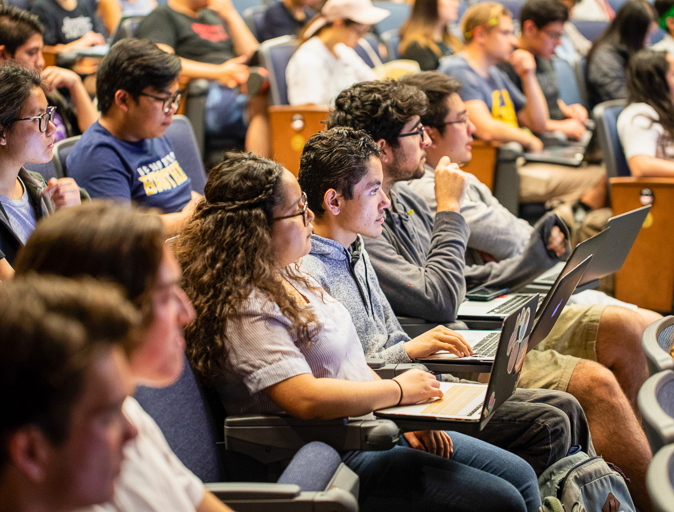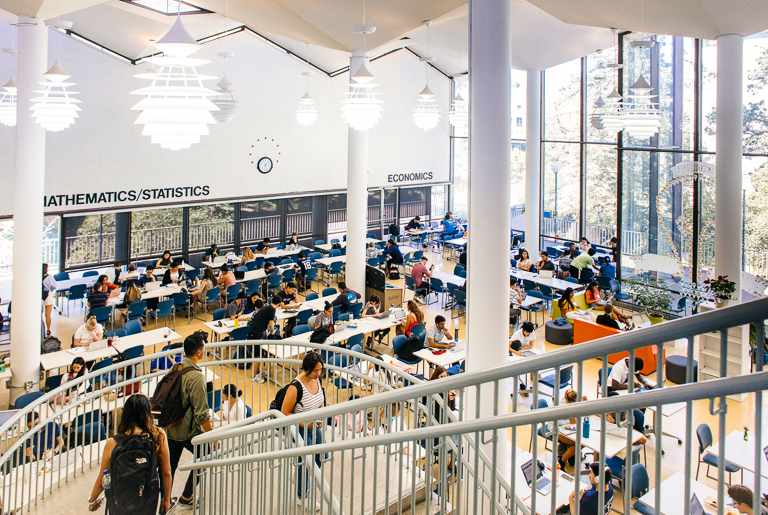
Helpful Habits to Build as Students
We’ve talked about how to be a successful student intern, but what makes a successful student? A lot goes into it, of course, and it’s a learning process in and of itself. Whether you’re just starting your first semester or are about to graduate, there is always something new to learn about being a student at Cal. Below, I’ve split up some tips into sections and also asked my fellow student writers what tips they have learned in their academic journeys.
Habit #1 – Time management
In the end, the number one habit for success is being able to self-regulate your time management. We hear this a lot, from established professionals to new graduates reflecting on their college experiences, but it is a crucial skill to develop. There is no better way to build it than by being a student and managing all that we do, so here are some examples of how to do that!
Start early. If you have a paper due Friday, have your draft ready before Monday so you have time to edit it. If you have a midterm coming up and a paper, this idea of starting early becomes even more important. Learn to stop procrastinating—start studying for your exam early so you don’t end up cramming the night before, and so other things and assignments don’t slip through the cracks or pile up.
Use a calendar to manage classes, work, and life in general. Whether you use a digital planner, Google Calendar, or a physical planner, this can make all the difference. Outline your syllabus at the start of each semester to make sure you know when your big projects are due—Google Sheets is a common method of organizing assignments among students.
Respond to (and send) emails as promptly as possible. If you’ve been meaning to email your GSI a question, do it ASAP, before the assignment deadline is two days away. Our inboxes are always full, but take the time to flag important emails so you don’t miss out on anything important. Learn more ways to stay in touch with what’s going on around campus.
Show up on time (or Berkeley time) to classes and appointments. Showing up on time means you get the seat you want (which can be very important in the long run) and maybe even see your professors put on their favorite music before the lecture. For new students, take time to map out and explore the campus before classes. Knowing where you’re going and budgeting extra travel time can go a long way to helping you show up on time. Also, appointments through campus departments usually don’t start on Berkeley Time, so keep that in mind.
Habit #2 – Self-reflection
Be honest with yourself about what is and isn’t working in your routine. As you build this habit, make sure to not compare yourself to others. Everyone has what works for them, and it will look different from what works for you.
Schedule self-care and breaks. Find what you enjoy doing and what relaxes you. Try a workout class at the RSF, take a nap, take a walk around the block, or listen to a podcast. Here are eight other ways to take a break.
Get enough sleep. This is especially important before an exam. What defines “enough sleep” is different for everyone—I try to aim for seven hours, and my roommate aims for six. Figure out what works best for you and make that your goal.
Listen to your body and learn your limits. You’ll get better at this the more you work on it. A lot of it entails getting enough sleep, taking breaks, and not skipping meals, no matter how convenient it may seem in the moment.

The Student Learning Center. Photo by Elena Zhukova.
Habit #3 – Use available resources
We’re in a unique environment because there is so much around us designed to assist us. Don’t be afraid to use these resources and ask for help when you need it. You’re not alone, and you’re more than likely not the only one who needs help with something.
Don’t be afraid to ask questions. Whether in class or office hours, don’t be afraid to ask your professors or GSIs about topics you cover in class. They’re human too!
Seek out tutoring or study groups. The Student Learning Center is a great place to get started. Another great resource is your classmates—create a study group or join one and work through complex topics together. You’re probably not the only one confused by a concept.
Be an active learner and an engaged student. It’s tempting, but don’t start playing 2048 in all of your lectures. Take notes, and compare them with your classmates. Don’t forget that you get back what you put in.
Make the effort to find those resources. There are a lot out there, and sometimes they take a little digging to find. But the good thing is that a lot of them are free and easily accessible, down to qualifying for free groceries with CalFresh or stopping by the Food Pantry on campus.
See It In Action: Advice from 1st through 4th years
I asked my coworkers the same question: What’s one thing you’ve learned during this academic year about succeeding as a student at Cal? Here are their responses and words of wisdom:
Reva, first-year majoring in society and environment: I’ve learned that a lot of my success as a student at Cal is tied to my ability to form meaningful connections with the people around me. It’s so hard to understate the growth I’ve experienced from hearing new perspectives, sharing the skills I have, and exploring the opportunities in and around Berkeley with new friends and classmates.
Shannon, second-year majoring in political economy and anthropology: If I am taking a reading-heavy class that is a bit more difficult to comprehend, I make sure to do the readings and come up with at least 5 solid questions I have about the text that I can ask the professor in lecture. Whether or not I do have the time to ask them in lectures, simply coming up with the questions helps solidify my comprehension of the author/text and prevents me from just skimming briefly over the text without genuinely retaining the meaning of the works.
Nina, second-year majoring in film and minoring in Japanese: Find a study space that suits you—some people like a coffee shop because the hustle and bustle keeps them going and they can order a fun little drink. Some people like an empty classroom because it feels like you’re still in an academic setting, or the libraries because there’s a very quiet, focused environment there which encourages you to stay productive. One of my roommates prefers studying in bed because she says that studying at her desk feels like being in an academic prison, but I love the focus I associate with sitting at my desk. Figure out what works for you!
And for language learners: study a little bit every day. I cannot stress how important this is. I review my kanji and vocabulary Quizlets every night to better retain information because I’m often learning how to read and or write 50 to 100 kanji every two weeks or so!
Hosea, fourth-year majoring in cognitive science and minoring in creative writing: A habit I developed is picking and trying out a self-improvement goal every week. It started when I took my Neuropsychology of Happiness class, where we were assigned to do weekly happiness practices. Over time, I have incorporated and adapted this practice into my life. I don’t feel stressed about meeting the goal; it’s like a weekly focus. For example, I’ve had goals of being more mindful and not using my phone when I walk, practicing gratitude for challenges, and practicing self-compassion. Doing so makes me feel like I’m constantly growing and some of the weekly goals are stuck as habits!
Preslee, fourth-year majoring in English and minoring in creative writing: I have, and continue to practice, separating work and life as a Cal student. It’s easy to allow your academics to consume your entire schedule and let work bleed into the nighttime or the weekends. I found that once I assigned it to a kind of 9 to 5-weekday structure, I was able to be more productive and get the recharge I needed to maintain this productivity. Even setting an hour or two-hour time blocks to a specific class or task eased the weight of these assignments instead of dedicating an entire day to them. I understand balance is a term that feels meaningless in its overuse, but it’s crucial to practice for anyone who is juggling school, work, and extracurriculars so that the tasks don’t feel mentally insurmountable.
I’ll leave you with my final piece of advice: be patient and kind to yourself. Remember that everyone is also figuring out what works best for themselves, and that what works best for them might not be as helpful for you. And find the fun in what you’re learning in classes—it makes it all a little easier.
Melissa Mora-Gonzalez is a third-year student at UC Berkeley majoring in English and minoring in conservation and resource studies. Feature photo by Elena Zhukova.
Want More?
- Discover free academic and wellness resources
- Read a senior’s advice on managing anxiety as a student
- Learn how Hosea manages his busy schedule